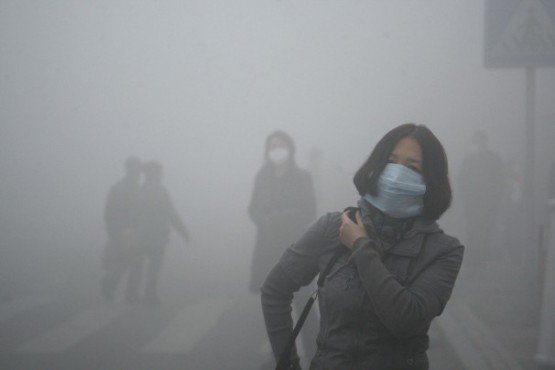Let me put it this way – how can you not be?
Here are some of the facts…
Climate change, aka Global Warming, is due to human created pollution; 96% of the cities in China fail environmental probes; air pollution spreads with the wind and does not pay attention to border restrictions nor distance; air pollution is the main cause for lung cancer; air pollution costs governments billions of dollars each year; according to the World Health Organization New Delhi is the most polluted city in the world; more than half of the people in the U.S. still breathe contaminated air according to the American Lung Association; Paris’ anti-pollution car ban program started in attempt to reduce pollution; an estimated 7 million people have died in 2012 due to air pollution; the list goes on and on…and the scariest thing is – we are reckless about it.
Seven million people – that’s the population of a small country.
I know what you are thinking, China, New Delhi, Paris – they are far away, it’s their problem not mine. Wrong! It is literary your problem – there are already studies proving that 12% to 24% of the daily sulfate concentrations in the air in the United States is due to the Chinese air pollution. The “westerlies” winds are “to blame”; they pick up all the smog and contamination in the air from China and bring it all the way to the U.S., so all this outsourcing of the American manufacturers to China is not only detrimental for the Chinese pollution, but also for the rest of the world.
We cannot expect an increasing level of pollution in one part of the world to remain trapped there, without affecting the rest of the planet. Let’s look at Global Warming, for example, according to the United Nations Panel on Climate Change, humans are responsible for “at least half of the observed increase in global average temperatures since 1950”, not to mention that all these “extreme weather conditions” that we’ve been experiencing around the world are just going to get more and more common. The water level will continue to rise due to the melting ice in the Antarctica, and the climate will continue to change in the future, even if we stop producing any pollution today.
That’s how important this is!
We have pushed nature so much that there is no turning back, all we can try and do is to slow it down or we might as well get used to the weather forecast predicting an earthquake, a tornado or a hurricane every other day.
There is a saying that we tend not to appreciate something until we have actually lost it. Well, we are about to lose something. We are about to lose our health, we are about to lose our right to live in an environment where you are not afraid to breathe, we are about to be wearing masks in order to breathe safely on a daily basis, we are about to destroy what we were supposed to protect.

Don’t believe me? Take a look at China and New Delhi. The smog is so thick you cannot see a bus until it hits you. Beijing was rated at such a low level that it is “barely suitable for living”, according to the World Health Organization and the University of Washington in Seattle, the concentration of PM2.5 particulates in the air (PM or particulate matter cannot be blocked out from our system and can easily enter and damage our lungs) exceeds 300 micrograms per cubic meter, the maximum allowed amount is 10.
Paris took some desperate measures in order to decrease the amount of PM2.5 particulates in the air. They put a ban on the cars for a period of five days, made all of the public transportation available – free, including the different bicycle services and the electric vehicle rentals. It cost the city around $5.6 million per day, but it also prevented a huge amount of carbon emissions to be released in the air.
How about the U.S., according to the American Lung Association in 2009 half of the population in America breathes air that has dangerously high pollution levels; five communities with the worst air pollution levels were all in California, each one scoring the top on a different criterion.
What do I mean by that? There are different types of pollution – air, water, soil, noise, radioactive, thermal, light, visual, personal, fighting pollution…you name it. All of which are different from each other, yet connected. For example if you have air pollution, it is very likely that it is the result of thermal pollution (coal, factories, etc.) and/or noise pollution (cars, trucks, construction).
According to the EPA: “….motor vehicles are responsible for nearly one half of smog-forming volatile organic compounds (VOCs), more than half of the nitrogen oxide (NOx) emissions, and about half of the toxic air pollutant emissions in the United States.” This alone is a big statement, no wonder companies are promoting carpooling and the electric vehicle renting services are becoming more and more popular.
I don’t know about you, but when I read about the nuclear waste, the coal output, the drainage of factory compound in the water, I feel like I cannot do much about it, if anything. But when I read that driving my car to work adds up to such a gigantic part of the total air pollution, my first thought was – finally something that I can change. With the same thought in mind, the hybrid-electric, electric gas hybrid, all electric and hydrogen fuel cell vehicles were created.
How do they benefit us? For a comparison, a conventional vehicle on a 100 mile trip produces greenhouse emissions (equivalent in CO2) equal to 87lb, while an all-electric one can go as low as 54lb and sometimes more.
Let’s take Tesla for example. I’m pretty sure there are more people out there today that have heard of the car manufacturer rather than the inventor himself, but just like the inventor’s ideas, the car is a revolutionary piece of art with magnificent performance and design, all of which are at no cost to the environment or people’s health. The Model S has an acceleration of 0 – 60 mph in 3.2 sec with an energy usage equivalent to 95 miles per gallon and has plenty of trunk storage. To say that Tesla has changed the way we think about electric cars is little, it has completely wiped off the idea of a small, barely moving vehicle and it has replaced it with a state of the art style and incredible performance, not to mention all of the incredible gadgets and features it has.
As amazing Tesla is, it is not the only one targeting the environmentally friendly consumers and providing a sustainable and viable solutions for the modern world’s problems; Toyota is on the run as well. Toyota has just released – the Mirai – hydrogen fuel cell vehicle, which virtually has no waste what-so-ever – just water, the only by-product left behind from creating electricity with hydrogen and oxygen in the fuel cell stack. The Mirai can go up to 300 miles per fill, refuels in about 5 minutes and is listed as a zero emissions vehicle in California.
Both of these vehicles are stunning, in terms of design and performance. It is hard to believe that we can now enjoy a flawless vehicle without harming ourselves and contaminating the air we breathe. At least some of us can, it is true that technology like this doesn’t come cheap, however compared to the price of your health it is miniscule.
Let’s say we cannot afford an electric vehicle (even though there are quite few cheaper options out there), there is still a way to decrease the number of vehicles on the road and thus decrease the amount of pollution and green gas emissions in the air, which will consecutively lead to a better overall health and well-being of the society.
I don’t know about you, but I’m taking my bike to work tomorrow. The sad side is that I have to wear a mask when I do that, just like the people in China, the only way available to protect ourselves from the smog in most cities.
Is this the life we want to live?
Think about it and let us know what you would do to stop the pollution in your area.



